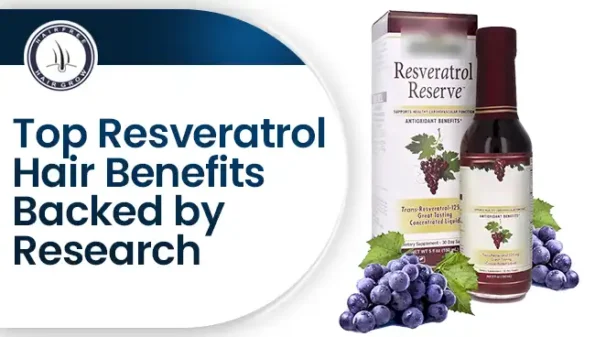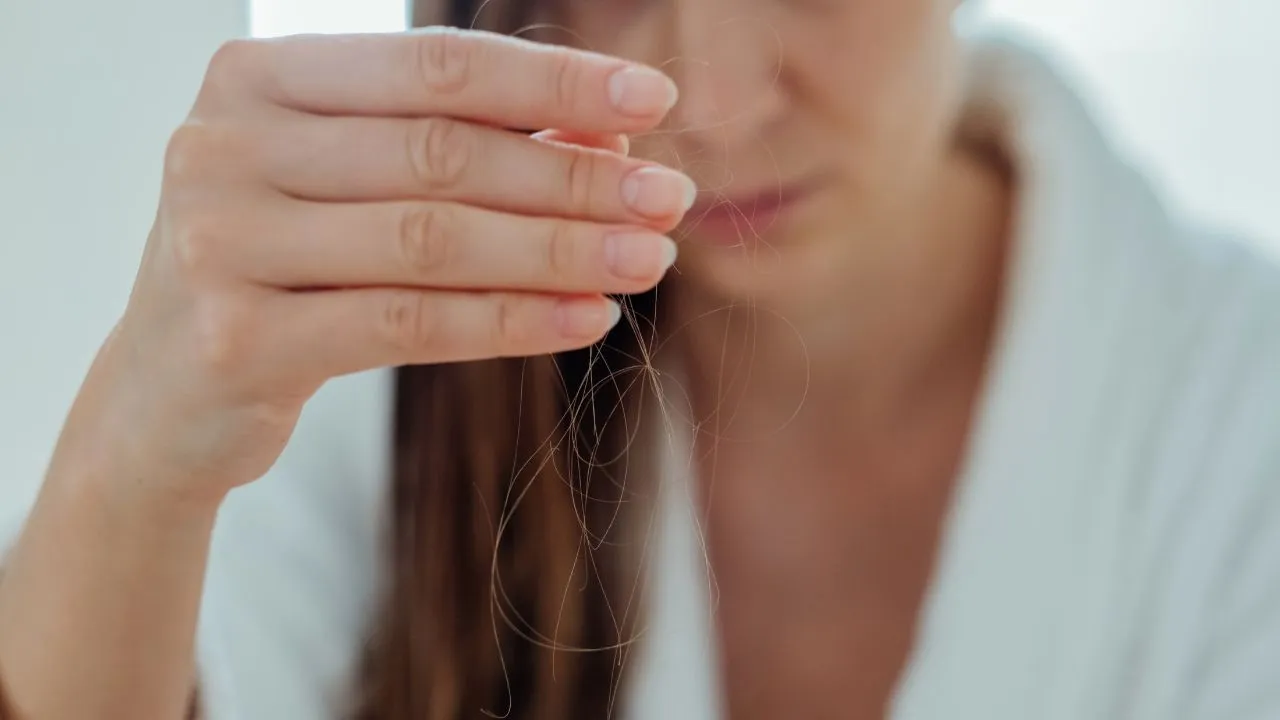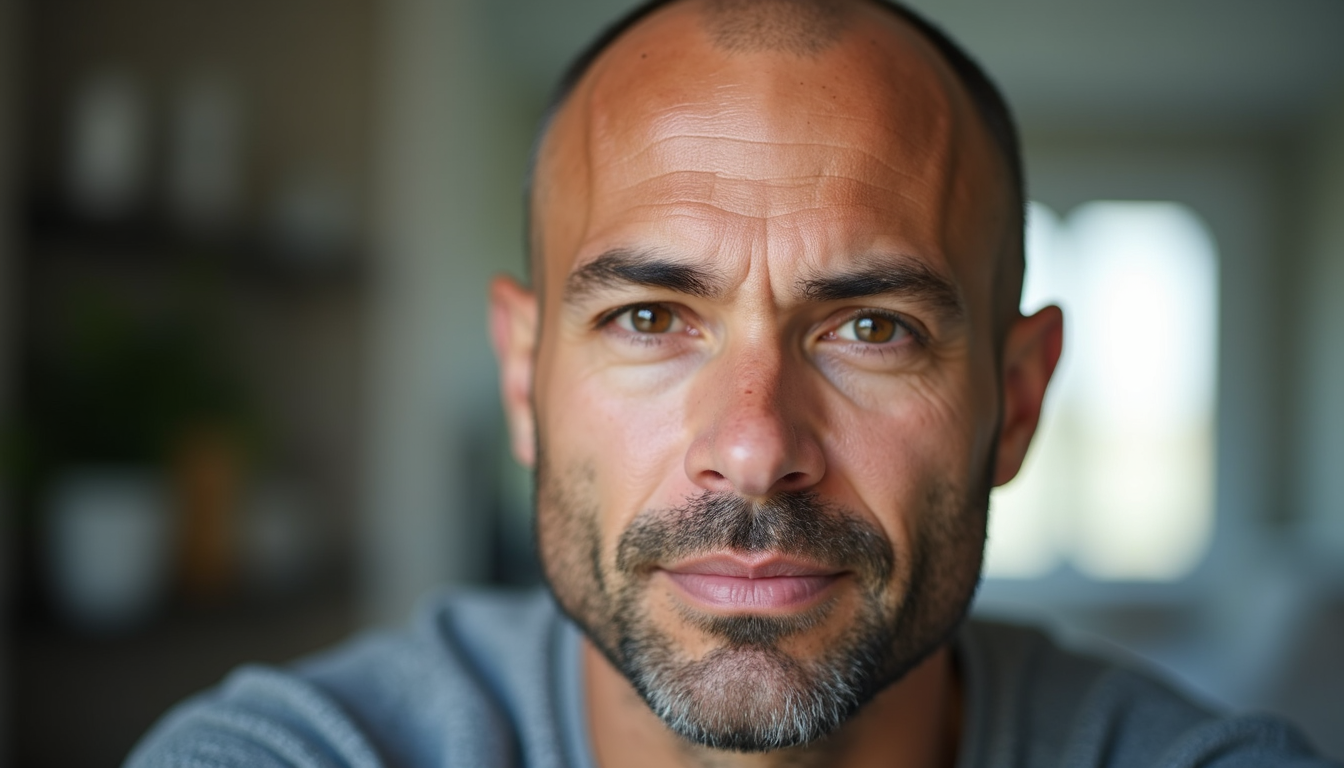Who doesn’t love a glass of red wine, a handful of juicy grapes, or a square of dark chocolate? These treats aren’t just delicious—they’re packed with resveratrol, a natural compound often praised for its heart-healthy and anti-aging perks.
But here’s a surprising twist: Did you know resveratrol might also work wonders for your hair? That’s right—resveratrol hair benefits could be the secret to tackling hair loss and boosting growth. Wondering how this plant-powered ingredient can help your locks?
Don’t worry, we’ll break down the resveratrol hair benefits, how it works, and simple ways to use it. So, can resveratrol really transform your hair? Let’s dive in and find out!
What Is Resveratrol, and Why Does It Matter for Hair?
Resveratrol is a natural polyphenol found in plants like red grapes, peanuts, and berries. It acts as a shield for plants against stress, and when we consume or apply it, it delivers a range of health perks, from fighting inflammation to supporting vitality.
While it’s long been praised for wellness, recent research highlights resveratrol hair benefits—think hair growth, less shedding, and tackling root causes of thinning. Whether you’re battling hair loss or just want a healthier mane, resveratrol is worth a closer look.
How Can Resveratrol Benefit Hair Health?
1. Promotion of Hair Follicle Transition
Hair follicles cycle through phases: anagen (growth), catagen (regression), and telogen (rest). A 2021 study demonstrated that topical application of resveratrol on shaved C57BL/6 mice significantly promoted hair growth by stimulating the transition from the telogen to the anagen phase. Ex vivo experiments showed increased hair shaft length and delayed entry into the catagen phase in human hair follicles treated with resveratrol.
2. Protection Against Oxidative Stress
Oxidative stress can damage hair follicle cells, leading to hair loss. Resveratrol’s antioxidant properties help protect dermal papilla cells from oxidative damage, thereby supporting healthy hair growth.
3. Activation of Hair Follicle Stem Cells
Resveratrol has been shown to activate hair follicle stem cells, promoting their proliferation and differentiation. This activation is crucial for initiating the anagen phase and sustaining hair growth.
4. Enhancement of Scalp Microcirculation
Adequate blood supply is essential for delivering nutrients to hair follicles. Resveratrol has been found to promote angiogenesis, enhancing vascularization around hair follicles and improving microcirculation.
Clinical Evidence
A randomized, double-blind, placebo-controlled clinical trial evaluated the efficacy of a hair serum containing resveratrol on 60 subjects over 12 weeks. The study reported a 61.47% reduction in hair shedding and a 68.19% decrease in hair fall from combing. Additionally, there was a significant increase in the anagen-to-telogen hair ratio, indicating enhanced hair growth.
Additional Benefits of Resveratrol for Hair Health
Aside from direct follicle stimulation, Resveratrol also targets underlying causes of hair thinning:
Balances Hormones (Especially in PCOS)
A clinical trial on women with Polycystic Ovary Syndrome (PCOS) showed that taking 1000 mg of Resveratrol daily reduced androgen levels (like testosterone and DHEA-S) by 22%. High androgen levels often trigger hair loss, especially in women. By restoring hormonal balance, Resveratrol may help prevent androgenic alopecia.
Anti-Inflammatory and Antioxidant Effects
Inflammation and oxidative stress are major drivers of scalp issues like dandruff, dermatitis, and hair fall. Resveratrol combats both, creating a healthy environment for hair regrowth.
Is Resveratrol Safe?
Yes — when used correctly.
- Dietary Resveratrol (from grapes, berries, etc.) is safe and even healthy.
- Topical Resveratrol serums, like the ones we use at our clinic, are also generally well-tolerated.
- Oral supplements (especially in high doses above 2500 mg) may cause side effects such as nausea, diarrhea, or interactions with medications like blood thinners or NSAIDs. Always consult a doctor before starting supplements.
Application Methods
1. Topical Application
Applying resveratrol-infused serums directly to the scalp allows for targeted delivery to hair follicles. This method has shown promising results in both animal and human studies.
2. Combination with Microneedling
Microneedling creates micro-channels in the scalp, enhancing the absorption of topical treatments. Combining microneedling with resveratrol application may further stimulate hair growth by improving serum penetration and activating hair follicle stem cells.
Safety and Considerations
Resveratrol is generally considered safe when applied topically. However, it’s advisable to perform a patch test before full application to rule out any allergic reactions. If you are pregnant, nursing, or have underlying health conditions, consult a healthcare professional before starting any new treatment.
Foods That Contain Resveratrol
Resveratrol is naturally found in a variety of plant-based foods. Including these in your diet can offer not only hair health benefits but also antioxidant and anti-inflammatory support for your entire body.
Here are some resveratrol-rich foods:
Food Item | Average Resveratrol Content (mg/kg) |
Red Grapes (skin) | 0.24–1.25 mg/100g |
Red Wine | 1.5–3.0 mg/L |
Blueberries | 0.3–1.9 mg/100g |
Peanuts (raw) | 0.3–1.0 mg/100g |
Dark Chocolate (cocoa) | ~1.85 mg/100g |
Cranberries | 0.01–0.26 mg/100g |
Mulberries | 0.02–0.55 mg/100g |
Pistachios | 0.01–0.10 mg/100g |
Interesting Stat: According to a study published in the Journal of Agricultural and Food Chemistry, red wine contains significantly more resveratrol than white wine — nearly ten times as much — because red wine is fermented with grape skins, where resveratrol is highly concentrated.
How to Increase Resveratrol Intake
If you want to harness the hair-growth potential of resveratrol, here are some ways to naturally boost your intake:
1. Include More Whole Foods
- Snack on a handful of peanuts or pistachios
- Add blueberries or cranberries to your breakfast
- Enjoy a glass of red grape juice or moderate red wine (if suitable for you)
2. Use Resveratrol Supplements
- Supplements offer higher, more concentrated doses
- Look for trans-resveratrol, the most bioavailable form
- Dosages typically range between 100 mg–500 mg per day, but always consult your doctor before starting
3. Topical Use for Hair
- Use resveratrol-infused serums or oils directly on the scalp
- Combine with microneedling for enhanced absorption
4. Pair with Complementary Nutrients
Resveratrol works even better when combined with:
- Quercetin (found in onions and apples)
- Vitamin C (citrus fruits, bell peppers)
- Omega-3s (flaxseed, walnuts, fatty fish)
Resveratrol + Expert Care = Real Results
Resveratrol may not be a miracle cure, but scientific evidence supports its effectiveness when used in the right way — especially under the guidance of trained professionals.
At Hairfree & Hairgrow, we combine Resveratrol therapy with microneedling, gene therapy, lifestyle advice, and advanced diagnostics to offer you a customized hair restoration plan that delivers real results.
Conclusion
1. Can Resveratrol Really Resveratrol Hair Benefits?
Yes, studies show that resveratrol stimulates hair follicles, promotes growth, and shifts hair from the resting (telogen) to the active (anagen) phase. It also helps reduce oxidative stress, which is a key factor in hair thinning and aging.
2. How Does Resveratrol Affect Hormonal Hair Loss?
Resveratrol helps balance hormones like androgens, especially in conditions like PCOS, which can reduce hormone-related hair thinning. It supports overall scalp health and reduces inflammation that worsens hormonal hair loss.
3. Is Topical Resveratrol Better Than Oral Supplements?
Topical resveratrol is more directly effective for hair growth, while oral supplements provide general antioxidant benefits. Using both together can offer internal and external support for healthier hair.
4. Are There Any Side Effects of Resveratrol?
Low doses are safe, but high doses may cause nausea or interact with medications. It’s best to start with a small amount and consult a healthcare provider, especially if you’re on medication.
5. Which Foods Are Rich in Resveratrol?
Foods like red grapes, blueberries, peanuts, and dark chocolate are rich in resveratrol. Including these in your diet can boost your antioxidant intake naturally and support hair health.
Written By
MBBS, DDV
Dr. Shridevi Lakhe is a hair care expert known for her research on Resveratrol Hair Benefits. She helps patients improve hair growth and scalp health using safe, natural compounds backed by science and personalized treatment plans.
Disclaimer
We’ve made all possible efforts to ensure that the information provided here is accurate, up-to-date and complete, however, it should not be treated as a substitute for professional medical advice, diagnosis or treatment. See Detailed Disclaimers Here.





